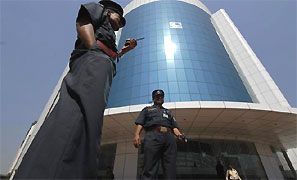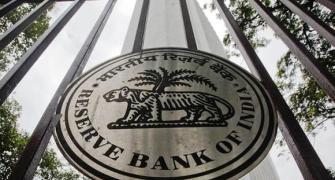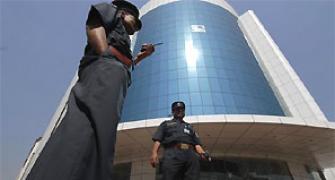 The Securities and Exchange Board of India (Sebi) had changed its mind on the treatment of ICICI Bank shares that came into the accounts of promoter group entities of Bank of Rajasthan (BoR), led by Pravin Kumar Tayal, following the merger of the two entities in 2010.
The Securities and Exchange Board of India (Sebi) had changed its mind on the treatment of ICICI Bank shares that came into the accounts of promoter group entities of Bank of Rajasthan (BoR), led by Pravin Kumar Tayal, following the merger of the two entities in 2010.
In August 2010, it had taken a view that the merger would not affect the ban on the promoter group entities from the securities market.
Nearly two years later, it said as the merger had been approved by the Reserve Bank of India (RBI), the promoters could be allowed to sell these shares.
RBI spoke to Sebi before giving its approval to the merger, in August 2010.
The central bank approved it only after Sebi had clarified that the ban on the promoter group entities of BoR would continue to apply with respect to the ICICI Bank shares these would receive as a result of the merger process.
The Sebi volte face, which emerges from documents accessed by Business Standard, throws fresh light on the merger, now a subject of a Central Bureau of Investigation (CBI) inquiry and court cases.
The documents were received by one of the complainants under the Right to Information Act and forms part of the complaints filed with various authorities.
In a letter dated August 11, 2010, a Sebi official said, “The ex parte interim order was passed by Sebi on March 8 2010, and will not come in the way of the proposed merger of BoR with ICICI Bank."
"However, this order will continue to operate on the entities named in the order, including the BoR shareholders who are likely to get the shares of ICICI arising out of the proposed merger, in respect of their operation in the securities market, as has been specified therein.”
This Sebi letter referred to a communication from RBI dated August 9 for a clarification on the matter — “Sebi was requested to clarify as to whether the interim order would come in the way of the amalgamation process, since the entities named in the Sebi order hold the shares of Bank of Rajasthan Ltd and these will have to be swapped with the shares of ICICI Bank Ltd.”
A day after this, on August 12, 2010, RBI approved the merger at a swap ratio of one share of ICICI Bank for every 4.72 shares of BoR.
Both RBI and Sebi spokespersons did not respond to emails seeking comments. Mails to ICICI Bank and Tayal on Wednesday also remained unanswered.
Thus, even after the merger was approved by RBI and then consummated, the March 8, 2010, order of Sebi which banned the promoter entities of BoR from dealing in the securities market continued in force.
However, in March 2012, Sebi wholetime member Prashant Saran revoked the earlier order so as to allow the promoters and their associates to sell their shares and referred the matter to the adjudicating authority to decide the matter on merits.
In this order, Saran contended the central bank goes into minute details before approving a merger and there was nothing “in the public domain” suggesting that RBI did not want the merger to happen.
“RBI circular dated May 11, 2005, lays down detailed guidelines for such mergers/ amalgamation. Therefore, it would be reasonable to assume RBI would have been fully satisfied as to the desirability.”
Following the reference from Saran, in February 2013, the adjudicating authority levied a penalty of around Rs 30 crore and did not pass any disgorgement order, saying illegal gains made by the entities could not be ascertained. The value of the promoter holdings was estimated at Rs 700 crore at the merger. Some estimate the total gains could be as high as Rs 2,600 crore or Rs 260 billion.
Some promoter entities moved the Securities Appellate Tribunal and obtained further relief. Minority shareholders, who have challenged the decision in the Bombay High Court and complained to CBI, said the above letter of Sebi shows clearly that RBI had approved the merger only after Sebi certified the order would cover the shares of ICICI which would be allotted to the persons covered by the order.
“RBI’s decision to allow the merger was within the remit of its duties to allow a weak bank to merge with a stronger bank.
RBI could not have investigated the securities law violations and cannot have taken any action under the Sebi Act,” said a lawyer representing the shareholders.
The HC had issued notices to Sebi. Vijay Kumar Garg, part of the investor group which filed the writ, said Sebi was yet to respond.
The court also heard a separate public interest suit on the same matter last week and reserved judgment, according to Garg.
The Sebi interim order in March 2010 itself came about after RBI found several irregularities in shareholding disclosures by BoR and referred the matter to Sebi.
As of June 2007, the promoters held around 44 per cent stake in BoR. RBI had directed a reduction in the promoter holding to 10 per cent, by the licensing norms.
The promoters, instead, raised it to 63.15 per cent, while reporting they'd brought it down to 28.6 per cent.
REGULATORY JUGGLE
* March 10, 2010: Sebi, under C B Bhave, passes an interim order banning about 100 entities, including the BoR promoters, from the market
* May 2010: Proposal to merge BoR with ICICI Bank cleared by both boards
* August 9, 2010: RBI asks Sebi if the March order will prevent merger
* August 11, 2010: Sebi says no hurdle for merger but promoters can't sell swapped shares
* August 12, 2010: RBI approves the merger at swap ratio of 1:4.72 * February 2011: UK Sinha takes over as Sebi chairman
* June-August 2011: Allegations and counter-allegations on finance ministry intervention in Sebi
* March 2012: Sebi member Prashant Saran passes interim order lifting the ban on promoter entities, allowing them to sell the ICICI Bank shares.
* February 2013: An adjudication order was passed for minor penalty by a junior officer. The order says disgorgement could not be ordered as the amount of illegal gain not quantifiable










